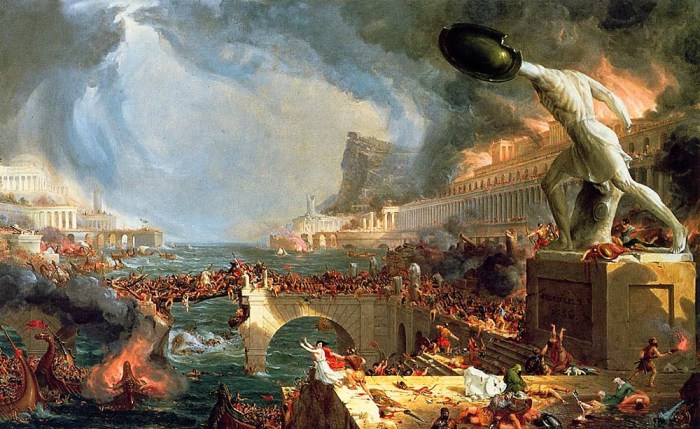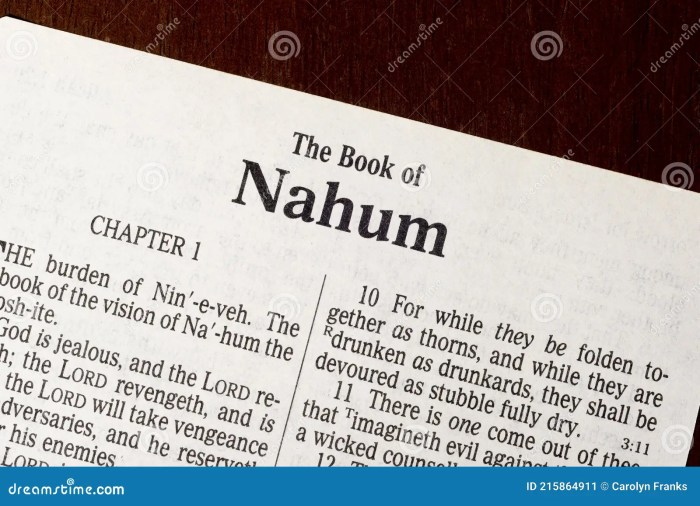The book of nahum relates the destruction of edom – The Book of Nahum, a compelling biblical text, unveils the imminent destruction of Edom. This prophecy, rooted in historical context and profound theological significance, offers a captivating exploration of God’s judgment and sovereignty.
The book’s message, delivered through vivid imagery and powerful symbolism, paints a vivid picture of Edom’s impending doom. Nahum’s words resonate with the urgency of divine retribution, revealing the consequences of Edom’s arrogance and hostility toward God’s people.
The Book of Nahum: The Destruction of Edom

The Book of Nahum is a prophetic book in the Hebrew Bible that primarily addresses the impending judgment of Nineveh, the capital of the Assyrian Empire. However, it also contains a brief but significant prophecy against Edom, the neighboring nation to the east of Israel.
Historical Context
The Book of Nahum was likely written during the late 7th century BCE, shortly before the fall of Nineveh to the combined forces of the Babylonians and Medes. Edom, a nation descended from Esau, had a long and often hostile relationship with Israel.
During the reign of King Ahaz of Judah, Edom took advantage of Judah’s weakness and raided its southern territory (2 Chronicles 28:17).
Prophetic Message
In the Book of Nahum, the prophet pronounces God’s judgment on Edom for its arrogance and hostility towards Israel. The specific verses that relate to the destruction of Edom are found in Nahum 3:1-7.
- Nahum 3:1: “Woe to the bloody city, full of lies and plunder, never without victims!”
- Nahum 3:3: “Before them fire devours, behind them a flame blazes. The land is like the Garden of Eden before them, but behind them a desolate wilderness. Nothing escapes.”
- Nahum 3:6: “I will hurl fire at your walls and it will consume your fortresses.”
The reasons for Edom’s judgment include its pride and contempt for Israel, its oppression of the Israelites, and its rejoicing over Jerusalem’s destruction (Nahum 3:19).
Literary Analysis, The book of nahum relates the destruction of edom
The prophecy against Edom in the Book of Nahum is written in a vivid and forceful style. The prophet uses strong imagery and symbolism to convey the severity of God’s judgment. For example, he compares Edom to a “bloody city” (Nahum 3:1) and a “desolate wilderness” (Nahum 3:3).
The prophecy also contains several unique features. For instance, it is the only prophecy in the Hebrew Bible that is addressed specifically to Edom. Additionally, the prophecy is written in the form of a dialogue between the prophet and an unseen interlocutor.
Theological Significance
The destruction of Edom in the Book of Nahum has significant theological implications. It demonstrates God’s sovereignty over all nations and his justice in punishing those who oppress his people.
The prophecy also reveals that God is faithful to his covenant with Israel. Despite the Israelites’ own sins, God will not allow their enemies to go unpunished.
Comparative Study
The prophecy against Edom in the Book of Nahum can be compared to other biblical texts that address the destruction of nations. For example, the Book of Amos contains a prophecy against Moab, another neighboring nation of Israel (Amos 2:1-3).
Both prophecies use similar language and imagery to describe the destruction of the target nations. However, the prophecy against Edom is more specific and detailed, and it emphasizes the theological significance of the event.
Clarifying Questions: The Book Of Nahum Relates The Destruction Of Edom
What is the historical context of the Book of Nahum?
The Book of Nahum is believed to have been written in the 7th century BCE, during the reign of the Assyrian king Sennacherib. Edom, a neighboring nation to Israel, had allied with Assyria and participated in its conquest of the Northern Kingdom of Israel.
What are the key themes of the Book of Nahum?
The Book of Nahum focuses on themes of divine judgment, the sovereignty of God, and the consequences of opposing God’s will. It also emphasizes the importance of repentance and the hope of restoration.
How does the Book of Nahum contribute to our understanding of God?
The Book of Nahum reveals God as a just and righteous ruler who holds nations accountable for their actions. It also shows God’s compassion and willingness to forgive those who repent.


